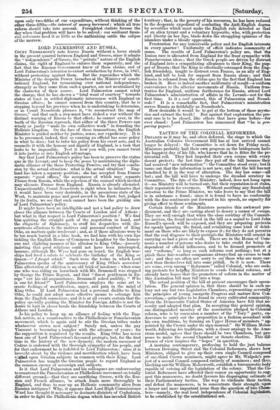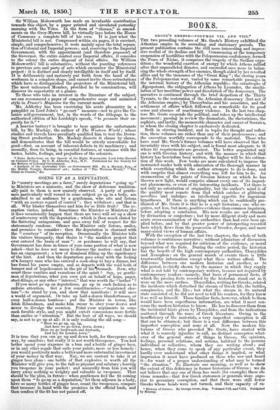TACTICS OF THE COLONIAL REFORM:US.
DREADED as it may be, and often deferred, the stage to which the Australian Colonies Government Bill has at last arrived cannot longer be delayed : the Committee is set down for Friday next. Ministers probably hail their own progress as the bridegroom hails the happiest day- of his life, who knows that he is fitter for the pa nitential cell. They had impeded their own course with every decent pretext; the last time they put off the bill because they had received "new information " : the Committee stood over; but it turns out that the information is not new, and that the hill has not benefited by it in the way of alteration. The day has come—all but ; and the bill will have to undergo the dreaded scrutiny in Committee. The fate of the Ministry, indeed, does not hang upon it—no Ministry will be turned out; but their reputation is at stake, their reputation for evermore. Without ascribing any fraudulent intention to the Prime Minister, we take leave to say that the bill is in substance a fraud; since it is found to have no conformity with the fine sentiments put forward in his speech, no capacity for giving effect to those sentiments.
Certain friends of the Ministers perceive this awkward pre- dicament, and they are casting about to descry a corner of escape. They see well enough that when the close scrutiny of the Commit- tee arrives, the fraud involved in the bill as a sequel to Lord Jahn Russell's speech will be exposed, and they are preparing pretexts for openly ignoring the fraud, and retaliating some kind of detri- ment on those who are likely to expose it; for they do not perceive that the real disgrace to their proteges the Ministers will consist in carrying so bad a piece of work. There are in the House of Com- mons a number of persons who desire to take credit for being in- dependent of official influences, and to be deemed promoters of any "reforms," so long as such reforms cost nothing ; but at a pinch these fair-weather companions always find an excuse to back out ; and they are often not sorry to see those who are more ear- nest than themselves fall into some pitfalL So it is now. There are some, even among " Reformers " called Colonial, who are seek- ing pretexts for helpThg Ministers to evade Colonial reforms, and already have hopes that the promoters of reform in the matter of this Australian bill may fall into a trap.
The actual position of the bill at present encourages their specu- lation. The general opinion is, that there should be in each ea lony not one but two Legislative Chambers, representing severally the principles of young energetic Progress and mature firm Con- servatism' —principles to be found in every cultivated community. Even the Democratic United States of America have felt that ne- cessity and adopted that plan. In accepting this general opiniou, one distinguished member of the association pledged to Colonial reform, who is by connexion a member of the " Tory " party, en- deavours to carry out the proposition in a fashion accordant with his own traditions, by forming an Upper House of members " ap- ' pointed by the Crown under its sign-manuaL" Sir William Moles- worth, following his traditions, with a closer analogy to the Amer riean model, agrees that there should be two Chambers, but pro- poses to make the second Chamber or Senate elective. This dif- ference of view inspires the " hopes " in question. A morning contemporary, professing to hold the just balance between Downing Street and the Colonial Reformers, shows how Ministers, obliged to give up their own single Council composed of one-third Crown nominees, might agree to Mr. Walpole's pro- ject a a second Council composed entirely of nominees ; and thus, blocking out Sir William Afolesworth, establish a bureaucratic body capable of vetoing all the legislation of the colony. That the Co- lonial Reformers have afforded their censor an opportunity to sug- gest this manceuvre, no doubt favours his disparaging estimate of their Parliamentary tactless. The way to vindicate their tactics, and defeat the manceuvre, is to concentrate their strength upon a larger and more important issue than the question of two Chtuirr bers—namely, the real local independence of Colonial legislation, to be established by the constitutional act.
Sir William Molesworth has made an invaluable contribution towards this object, by a paper printed and circulated yesterday morning with the Votes. In the form of "clauses," as amend- ments on the Grey-Hawes bill, he virtually lays before the House of Commons a complete bill of his own. It is just what the Ministerial bill is not. Compressed within six pages, it is succinct, simple, and comprehensive ; It rests mainly upon the total separa- tion of Colonial and Imperial powers; and, reserving to the Imperial Government, with the appointment (and therefore payment) of the Governor, the entire control over Imperial affairs, it concedes to the colony the entire disposal of local affairs. Sir William Molesworth's bill is substantive, without the puzzling references to previous acts and parts of acts which encumber the Ministerial project : it is distinct and clearly intelligible in itself and by itself. It is deliberately and maturely- put forth from the hand of the workman in a complete shape, and cannot invite those retractations which have so distinguished the projectors of the Ministerial bill. The most unlearned Member, provided he be conscientious, will discover its superiority at a glance.
To those who take an interest in the literature of the subject, we can recommend a paper of comprehensive scope and animated style in Fraser's Magazine for the current month.
Mr. Adderley has been exercising his acute pleasantry in a pamphlet on Lord John's "go-cart" measure—not to give the Co- lonies self-government, but, in the words of the titlepage to the authorized edition of his Lordship's speech, "to pr om o te their ca- pacity for it." * A heavier batteryt is brought to bear against the unfortunate bill, by Mr. Mackay, the author of The Western World ; whose studies and travels have peculiarly qualified him to test the Down- ing Street production. Mr. Mackay dissects it clause by clause, and demonstrates that the bill would be utterly- unworkable for good—first, on account of inherent defects in its machinery.; and secondly, from its being, in essential features, at variance with the tastes, habits, feelings, and prejudices of the colonists.
* Some Reflections on the Speech of the Ttiz,bt Honourable Lord John Russell on Colonial Policy. By C. B. Adderley, Esq., M'. Published for the Society for the Reform of Colonial Government.
-1. Analysis of the Australian Colo .es Government Bill. By A. Mackay, Esq., of the Middle Temple, Barrister-e .aw ; Author of " The Western World," "The Cites in Canada," 8m.



























 Previous page
Previous page